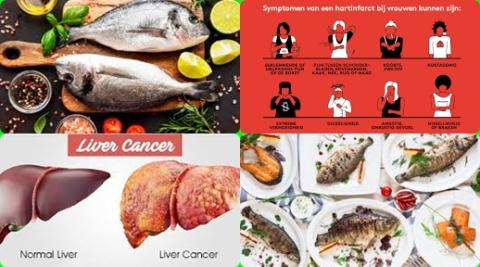
Objectives:
Does fish consumption decrease risk of cardiovascular disease, depression, mortality and cancer?
Study design:
This review article included a total of 34 meta-analyses of prospective observational studies, reporting summary relative risks (SRR) for 40 different outcomes obtained from 298 primary prospective cohort studies.
The summary relative risk (SRR) for each meta-analysis was recalculated by using a random-effects model.
Results and conclusions:
The investigators found moderate-quality evidence showed that each 100-g/d increment in fish consumption was associated with a 8% lower risk of all-cause mortality [SRR = 0.92, 95% CI = 0.87 to 0.97].
The investigators found moderate-quality evidence showed that each 100-g/d increment in fish consumption was associated with a 25% lower risk of cardiovascular mortality [SRR = 0.75, 95% CI = 0.65 to 0.87].
The investigators found moderate-quality evidence showed that each 100-g/d increment in fish consumption was associated with a 12% lower risk of coronary heart disease [SRR = 0.88, 95% CI = 0.79 to 0.99].
The investigators found moderate-quality evidence showed that each 100-g/d increment in fish consumption was associated with a 25% lower risk of myocardial infarction [SRR = 0.75, 95% CI = 0.65 to 0.93].
The investigators found moderate-quality evidence showed that each 100-g/d increment in fish consumption was associated with a 14% lower risk of stroke [SRR = 0.86, 95% CI = 0.75 to 0.99].
The investigators found moderate-quality evidence showed that each 100-g/d increment in fish consumption was associated with a 20% lower risk of heart failure [SRR = 0.80, 95% CI = 0.67 to 0.95].
The investigators found moderate-quality evidence showed that each 100-g/d increment in fish consumption was associated with a 12% lower risk of depression [SRR = 0.88, 95% CI = 0.79 to 0.98].
The investigators found moderate-quality evidence showed that each 100-g/d increment in fish consumption was associated with a 35% lower risk of liver cancer [SRR = 0.65, 95% CI = 0.48 to 0.87].
The investigators concluded evidence of moderate quality shows that 100-g/d fish consumption is associated with a lower risk of cardiovascular disease, depression, mortality and liver cancer and therefore, can be considered as a healthy animal-based dietary source of protein. Further research is needed for outcomes for which the quality of the evidence was rated low and very low, considering types of fish consumed, different methods of cooking fish and all potential confounding variables.
Original title:
Fish Consumption and the Risk of Chronic Disease: An Umbrella Review of Meta-Analyses of Prospective Cohort Studies by Jayedi A and Shab-Bidar S.
Link:
https://www.ncbi.nlm.nih.gov/pubmed/32207773
Additional information of El Mondo:
Find more information/studies on fish consumption, cancer and cardiovascular disease right here.